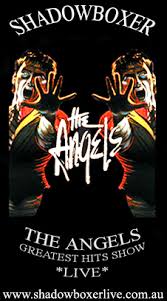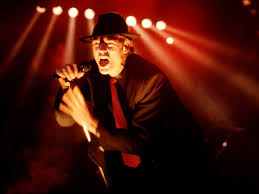
Take A Long Line (B Neeson/ J Brewster/ R Brewster) 1978 and Shadow Boxer (B Neeson/ J Brewster/ R Brewster) 1979 and No Secrets (G Bidstrup/ B Neeson) – Angels 1980.
Adelaide’s Angels were one of the seminal forces who shaped the great tradition of Aussie pub rock throughout the 1970’s and 80’s, they followed the trail blazed by Billy Thorpe and the Aztecs, the Colored Balls and AC/DC and were contemporaries of such beer barn boogie bands as Rose Tattoo, Cold Chisel, and Midnight Oil. Bernard Patrick “Doc” Neeson was thirteen years old and part of an Irish emigrant family who arrived in Australia in 1960, and settled in the outer Adelaide suburb of Elizabeth (SA), where Bernard’s father Barney had secured a job at the GMH plant. Conscription into the army in 1968 had derailed Doc’s career ambitions until he was de-mobbed, and commenced English and drama studies at Flinders University.

There he met the Brewster brothers, Ric and John, who came from a musical family, their father was the conductor of the Adelaide Symphony Orchestra, Ric was training as a classical pianist and his younger brother John was learning acoustic guitar, in the Bob Dylan style, whom he greatly admired. The brothers invited Neeson to join their acoustic Moonshine Jug and String Band (above) along with Charlie King (drums), Peter Thorpe (bass), Bob Petchell (banjo, harmonica), and Craig Holden (guitar), who released the EP Keep You On The Move on John Woodruff’s Sphere label, which was a top five hit in Adelaide, and they played support on a Cheech and Chong tour of Australia.

By 1974 the band had morphed into the hard- rocking Keystone Angels, and initially this caused them to lose their existing fan base who were more attuned to washboards, kazoos and banjos than electric guitars. But they persevered and secured support act spots on national tours by Chuck Berry and AC/DC, appeared at the last Sunbury Pop Festival in 1975 and in 1976 relocated to Sydney and signed with Alberts Music where they hooked up with production maestros Vanda and Young.
In 1977 Charlie King was replaced by Graham “Buzz” Bidstrup (drums), Neeson moved from bass to lead vocals, Chris Bailey was recruited on bass guitar, and at the suggestion of George Young, they shortened their name to the Angels. (Left to right above – John Webster, Chris Bailey, Doc Neeson, Buzz Bidstrup and Rick Webster). They were delivering a raucous and infectious brand of pub rock at such Sydney venues as the Bondi Lifesaver, the Royal Antler at Narrabeen and the Stage Door in the city, and in Melbourne at The Distillery, Hard Rock Café and the Station Hotel (Prahran), at these locations fire, safety and health regulations were generally ignored, as mostly male punters crammed in for a session of drinking and fist-pumping pub rock.

As the band was signed to Alberts, Vanda and Young produced their debut single in 1976, Am I Ever Gonna See Your Face Again which came to epitomize the beefy, manic, muscular, boogie-rock for which the band would become famous.

Once Doc Neeson assumed the mantle of front man his dynamic stage persona began to emerge, he was an actor who knew how to imbue the band’s live performances with intellect, a manic energy, and the antagonism and drama of surreal art. He introduced theatrical lighting and the use of shadows to add mystique and tension to live gigs, and these qualities became unique to the band, and set them apart from their pub rock contemporaries.
The pounding Take A Long Line was released in July 1978, Doc gives fair warning of what is to come when he opens with the line “ This is it folks…Over the top,” and the band shifts frenetically into top gear. Rick Brewster had developed the basic riff backstage at Sydney’s Chequers nightclub and Neeson has conceded that Bob Dylan’s word imagery on Subterranean Homesick Blues, influenced the lyrical structure and timing of the composition.
Take A Long Line became a defining moment for the group when it climbed to #29 for their first top thirty hit, the debut album, Face To Face, from which the song was lifted, charted #18 and sold 280,000 copies, the Angels had momentum, and Doc Neeson was emerging as a charismatic front man who could by turns be dramatic, histrionic, demonic, and beguiling, but always fascinating.

The band was becoming more autonomous now, Neeson was a creative lyricist and the Brewsters were quality riffmeisters, they had co-produced their first album with Mark Opitz and were focused on their next single, Shadow Boxer, which would be pre- released before their second studio album, No Exit.
Shadow Boxer was another high energy up-tempo outing, Neeson’s vocal attack was impressive, the song was inspired by a person the band members had seen sparring with a No Standing sign in Sydney’s King’s Cross. The lyrics reflect the sense of desperation, alienation, and abandonment felt by those who struggle with mental illness, homelessness, and lack of self-esteem- “Tell me truths that have no meaning/ Live in rooms that have no ceiling/ Now your friends are all departed/ So your secret’s closely guarded.” Shadow Boxer charted at #25 and the album No Exit took the group into the top ten for the first time when it climbed to #8.

By mid-May 1980 Vanda and Young were completely absorbed writing and producing hits for AC/DC, John Paul Young, and Rose Tattoo, and had handed over the reins to Mark Opitz for all Angels recordings. The band were upset and discouraged by the change, they departed Alberts Music and signed on with CBS Epic, their first single with the new label would be the pub rock classic No Secrets, and the first time Doc Neeson and drummer Buzz Bidstrup had written a song together.
It was their first single to chart top ten and a hit at #8, the song was an intriguing and voyeuristic glimpse into the life of one “Amanda the Actress”, “She lives in a tower armed with defences/ She’s learned from her mother and friends/ She walks like a fellow, dresses in day-glo/ When she’s in pain she pretends.” Is the enigmatic thespian in question a lover, a muse, a sex worker, a free spirit, a transvestite, a femme fatale? “Cos late in the night, when the lights are all out/ She slips off her stockings and shoes/She makes you her lover, and then you discover/ The smile she keeps, she keeps for you/ she keeps no, she keeps no, she keeps no secrets from you,”and concludes with the intriguing whispered question from Doc Neeson “can anybody please tell me what the time is?” which provided DJs’ with an ideal intro to a time check.
There was a certain undefined menace, threat, and sexual tension inherent in the song, Neeson’s vocals are dramatic and highly theatrical, it represented a creative peak for a band who were delivering incendiary live performances around the country and overseas.

The band’s third studio album Dark Room, co-produced by the Brewster brothers, is generally regarded as one of their best records, crammed with great original songs including Poor Baby and Face The Day, it took the band into the top 5 emulating the success of their previous album release Angels Greatest Hits earlier in 1980.

